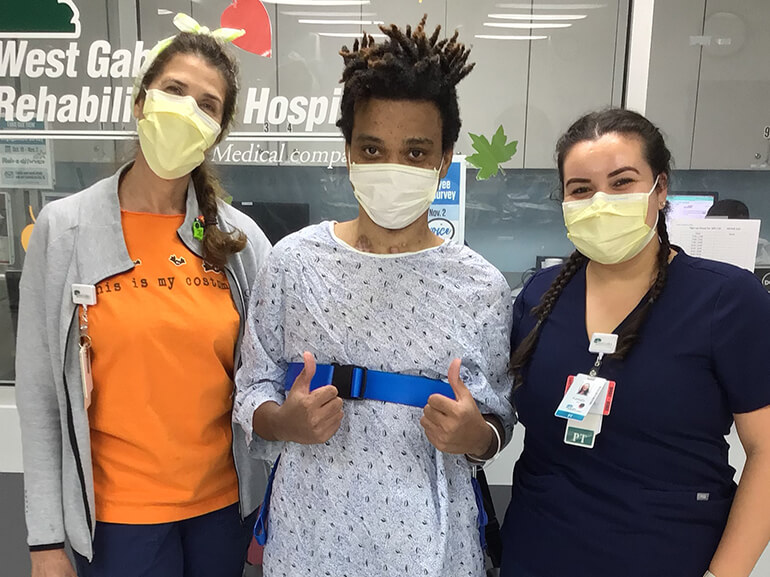Gusto's story

Gusto Petit
Gusto Petit was living the typical life of a 21-year old, working as a food runner/room service for a hotel in his native country of Haiti. Gusto is also very close to his mother and sister and enjoyed playing and watching sports and going out with his friends. One day in June, he allowed a friend to drive his car when they wanted to take a ride. Little did he know that his life was about to change dramatically.
While his friend was behind the wheel, they were involved in a rollover car accident. Gusto, who was not wearing a seat belt at the time of the crash, was severely injured. Not only did he go into hypovolemic shock, a life-threatening condition that results when more than 20 percent of the body's blood is lost, Gusto also suffered a broken pelvis and sacrum, bruised lungs, displacement of several vertebra and burns on 15 percent of his body.
After being rushed to a nearby hospital, Gusto required the placement of a feeding tube as well as a colostomy. He also had a pelvic external fixator, or a surgical treatment where rods are screwed into bone and exit the body to be attached to a stabilizing structure outside of the body, in order to hold his broken pelvis in place while he began to heal. Unable to stand or walk, Gusto was moved to a rehabilitation center in Haiti where he was confined to bed.
By August, Gusto’s condition had deteriorated to the point where he was flown to an acute care hospital in Miami. In addition to bone infections in his pelvis and sacrum, he was suffering from two blood clots in his legs, severe sepsis, pneumonia and a pressure ulcer on his sacrum, among other issues. Once he was stabilized, Gusto was transferred to West Gables Rehabilitation Hospital.
Upon arriving, Gusto’s main goal was to be able to walk again. Because he was still unable to bear weight on his legs due to the external fixator, physical and occupational therapists worked with Gusto to maintain his mobility, strength, endurance and flexibility. They began with basic range-of-motion exercises for his legs and progressed to using weights and resistance as part of his therapy. Gusto was also provided with a tilt-in-space wheelchair, which helped reduce pressure on the pelvis so he could be out of bed for longer periods of time.
In addition to physical and occupational therapy, Gusto spent a lot of time with the recreational therapists playing video games, doing arts and crafts, listening to his favorite Haitian music and socializing. This interaction helped Gusto endure the days when he was struggling and gave him hope.
After waiting several months for surgery to have the external fixator removed, Gusto finally saw the light at the end of the tunnel. In late October, tears of joy streamed down his face as he took his first shaky steps. At that point, all Gusto could think about was everything he needed to do to be able to walk again. Gusto was determined and reported feeling better each time he walked. He particularly enjoyed using the LiteGait, a gait training device that simultaneously controls weight bearing, posture and balance over a treadmill. Seeing his progress through time and speed on the treadmill was something concrete that kept Gusto pushing forward.
When Gusto's mother and sister came to the hospital for family training to learn how to help him when he returned home, they were amazed with the progress he had made. Gusto was grateful for the phone calls from his family and the support his therapists provided, which helped him stay focused and motivated on recovery.. “They never gave up on me and even played my favorite music during therapy sessions,” Gusto said. At discharge, Gusto walked out of West Gables Rehabilitation Hospital using a rolling walker, needing only minimal assistance. He will continue his recovery with home health services.
Gusto advises people going through a tough recovery to “keep your head up.” He also reminds everyone to “always wear your seatbelt.”